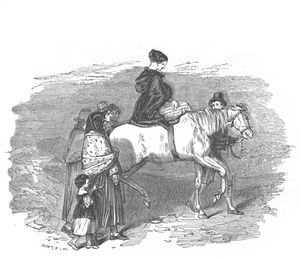Annotation:Óró Welcome Home
Back to Óró Welcome Home
ÓRÓ, WELCOME HOME! AKA - "Óró, 'sé do bheatha a bhaile." Irish, March or Polka (2/4 time, "with great spirit"). E Minor. Standard tuning (fiddle). AABB. "A hauling home song. The 'hauling home' was bringing home the bride to her husband's house after marriage. It was usually a month or so after the wedding, and was celebrated as an occasion next only in importance to the wedding itself. The bridegroom brought home his bride at the head of a triumphal procession--all on cars or on horseback. I well remember one where the bride rode on a pillion behind her husband. As they enter the house the bridegroom is supposed to speak or sing:--

Óró, sé do bheatha a bhaile, is fearr liom tu ná céad bo bainne:
Óró, sé do bheatha a bhaile, thá tu maith le rátha.
(Oro, welcome home, I would rather have you than a hundred milch cows:
Oro, welcome home, 'tis you are happy with prosperity [in store for you]).
Here is Mr. Hogan's note on this air:--'This song used to be played at the 'Hauling Home', or the bringing home of a wife. The piper, seated outside the house at the arrival of the party, playing 'hard' (i.e. with great spirit): nearly all who were at the wedding a month previous being in the procession. Oh, for the good old times!' This tune is called in Stanford-Petrie an 'ancient clan march': and it is set in the Major, with many accidentals, but another setting is given in the Minor. I give it here as Mr. Hogan wrote it, in its proper Minor form. In several particulars this setting differs from Dr. Petrie's two versions. It was a march tune, as he calls it: but the March was home to the husband's house. Dr. Petrie does not state where he procured his two versions" (Joyce). See Bayard's (1944) extensive note for "Bonaparte Crossing the Alps" for more on this tune family. Bayard maintains that the tune was used for a number of purposes, and not only the ones that Joyce identified. Bayard (Dance to the Fiddle, 1981) assigned to the name 'Welcome Home' to a huge tune family of myriad and diverse members with similar characteristics.
Words by Padraic Pearse (see below) refer to a welcome home to Irish exiles who might take part in the 1916 uprising [1], according to John Loesberg.
'S é do bheatha, a bhean ba léannmhar!
Dob’ é ár gcreach do bheith i ngébheann,
Do dhúthaigh bhreá i seilbh méirleach,
'S tú díolta leis na Gallaibh..
Óró, sé do bheatha 'bhaile
B'fhear liom tu na cead bo bhainne,
Óró, sé do bheatha 'bhaile,
'Nois ar threacht an tsamhraidh .... (Loesberg, Folksongs & Ballads Popular in Ireland, 1979).
See also Joyce's "Bringing/Bring Home the Bride" and Roche's "Hauling Home (The)" for other 'hauling home' march. See also the Scottish cognate melody "Oyster Wives Rant (The)."
Source for notated version:
Printed sources: Joyce (Old Irish Folk Music and Songs) 1909; No. 275, pp. 130-131.
Recorded sources:
